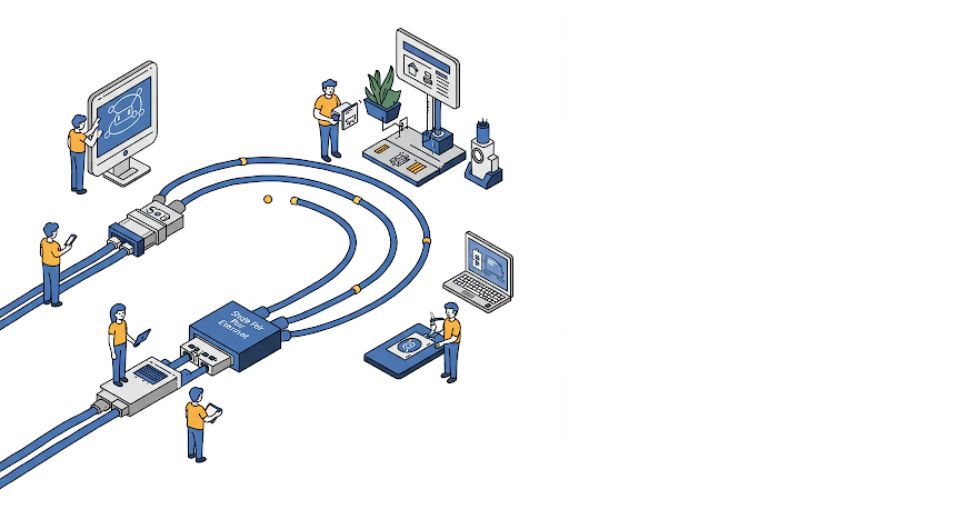MARKET OVERVIEW
In the digital connectivity, the Global PCI Express (PCIe) 4.0 Retimer market emerges as a crucial player, exemplifying the relentless pursuit of enhancing data transfer capabilities. This market, characterized by its robust technological underpinnings, plays a pivotal role in addressing the escalating demand for high-speed data transmission across various industries.
The Global PCI Express (PCIe) 4.0 Retimer market is a specialized segment within the broader realm of electronic components, dedicated to optimizing and refining the performance of PCIe 4.0 interfaces. These retimers, acting as signal conditioning devices, exhibit a profound impact on data integrity and signal quality, ensuring seamless communication within intricate electronic systems.
The significance of PCIe 4.0 Retimers lies in their ability to mitigate the challenges posed by signal degradation and attenuation in high-speed data transmissions. As data rates continue to surge, maintaining signal integrity becomes paramount, and these retimers play a pivotal role in revitalizing signals, thereby enabling the sustained delivery of data at unprecedented speeds. This technological prowess is particularly crucial in applications where real-time data processing and low-latency communication are imperative.
In electronic design and integration, the importance of PCIe 4.0 Retimers extends beyond mere signal conditioning. These components contribute significantly to the overall efficiency and reliability of electronic systems, fostering a seamless flow of information across interconnected devices. Whether in data centers, telecommunications infrastructure, or high-performance computing environments, the role of PCIe 4.0 Retimers is indispensable in meeting the escalating demands for faster and more reliable data transfer.
Furthermore, the Global PCI Express (PCIe) 4.0 Retimer market serves as a catalyst for innovation in the broader electronics industry. As the demand for higher data bandwidth continues to grow, the market drives research and development efforts to push the boundaries of signal processing and data transmission technologies. This fosters a competitive environment where advancements in PCIe 4.0 Retimers not only keep pace with market requirements but also anticipate future needs, positioning this segment as a cornerstone in the evolution of digital connectivity.
Global PCI Express (PCIe) 4.0 Retimer market is estimated to reach $20,260.0 Million by 2030; growing at a CAGR of 23.5% from 2023 to 2030.
GROWTH FACTORS
The PCI Express (PCIe) 4.0 Retimer Market is significantly influenced by key driving factors that propel its growth. The demand for faster data transfer and enhanced performance capabilities in electronic devices stands out as a primary driver, urging the market forward. As technology continues to advance, the need for more efficient and rapid data communication within devices becomes increasingly crucial, fostering the market's expansion.
Despite the positive momentum, challenges like market saturation and compatibility issues may hinder the market's growth trajectory. Saturation, where the market reaches a point of diminishing returns due to widespread adoption, poses a potential obstacle. Additionally, compatibility concerns with existing systems and devices may slow down the seamless integration of PCIe 4.0 Retimers, impacting the market's pace.
However, there exists the potential for lucrative opportunities that could fuel the market's growth in the coming years. The continuous evolution of technology and the advent of newer applications and devices present fertile ground for the PCIe 4.0 Retimer Market. As technology advances, creating new devices and applications, the demand for faster and more efficient data transfer solutions, like PCIe 4.0 Retimers, is likely to surge.
While challenges such as market saturation and compatibility issues may pose hurdles, the intrinsic demand for enhanced data transfer capabilities and the ever-evolving landscape of technology offer promising avenues for the PCI Express (PCIe) 4.0 Retimer Market. The delicate balance between challenges and opportunities shapes the future trajectory of this market, with the potential for sustained growth in the years to come.
MARKET SEGMENTATION
By Type
The PCI Express (PCIe) 4.0 Retimer Market, in its segmentation by type, unveils a nuanced landscape catering to diverse needs. This segmentation is a crucial factor in understanding the variety within the market. Within this categorization, the types are distinctly demarcated, providing insights into the specific functionalities of PCIe 4.0 Retimers.
The market unfolds with two primary types: 8 Channel and 16 Channel. The 8 Channel type signifies a configuration designed to handle eight distinct data channels, contributing to its efficacy in managing moderate data loads. On the other hand, the 16 Channel type, with its capacity to oversee sixteen data channels, reflects a more robust architecture suitable for applications demanding higher data throughput and efficiency.
The significance of this segmentation lies in its ability to address varying requirements within the technological landscape. The 8 Channel type caters to scenarios where balanced, yet efficient data handling is paramount, finding its applications in contexts that may not demand the highest data speeds but prioritize stable and reliable performance. In contrast, the 16 Channel type steps in where the demand for data-intensive operations is more pronounced, such as in high-performance computing or data-intensive applications.
The PCI Express 4.0 Retimer Market not only acknowledges but also strategically responds to the distinct needs of its users. It offers a tailored approach, ensuring that the technological solutions align with the specific requirements of the applications they serve. The segmentation, therefore, serves as a practical framework, guiding users and stakeholders toward selecting the most suitable type of PCIe 4.0 Retimer for their unique operational demands.
By Application
The PCI Express (PCIe) 4.0 Retimer Market, a landscape of technological innovation, finds its applications diverse and impactful. In this dynamic market, applications delineate the utility of PCIe 4.0 Retimers, with Servers being a primary domain. These Retimers play a crucial role in optimizing data flow within server systems, ensuring seamless communication and enhanced performance. The significance of PCIe 4.0 Retimers extends beyond servers, infiltrating Storage Applications, where data integrity and speed are paramount.
The adaptability of these Retimers finds its expression in the catch-all category of 'Others,' where their utility extends to various niches within the technological ecosystem. This inclusive category highlights the versatility of PCIe 4.0 Retimers, showcasing their relevance in applications beyond the delineated domains of servers and storage.
The continuous evolution of technology propels the demand for PCIe 4.0 Retimers, underscoring their integral role in shaping the efficiency and speed of data transfer within a broad spectrum of applications. From the intricate workings of server systems to the optimized storage of vast amounts of data, PCIe 4.0 Retimers stand as silent catalysts, ensuring the smooth flow of information across diverse technological landscapes.
REGIONAL ANALYSIS
The global PCI Express (PCIe) 4.0 Retimer market unfolds across diverse geographical regions, each contributing to the market's dynamics. Focusing on North America, this region stands as a significant player in the market landscape. North America, known for its technological advancements and robust IT infrastructure, serves as a major hub for the adoption and integration of PCIe 4.0 Retimers.
The prevalence of cutting-edge technologies in North America drives the demand for PCIe 4.0 Retimers, especially in sectors relying heavily on high-speed data transmission. The region's penchant for innovation and early adoption of advanced electronic components positions it as a key contributor to the global market.
Moving on to Europe, a similar trend emerges. The European market for PCIe 4.0 Retimers reflects the region's commitment to technological progress. With a well-established industrial landscape and a focus on optimizing digital processes, Europe becomes a fertile ground for the utilization of PCIe 4.0 Retimers.
The demand in both North America and Europe is further fueled by the increasing integration of PCIe 4.0 Retimers in a variety of applications. From data centers to consumer electronics, the versatility of these components aligns with the diverse technological needs of these regions.
The geographical segmentation of the global PCI Express (PCIe) 4.0 Retimer market highlights the pivotal roles played by North America and Europe. These regions, driven by their technological prowess and commitment to innovation, contribute significantly to the market's growth. The adoption of PCIe 4.0 Retimers in these geographies is not merely a trend but a testament to the integral role these components play in advancing digital connectivity and data transmission capabilities.
COMPETITIVE PLAYERS
Within the PCI Express (PCIe) 4.0 Retimer market, notable players contribute significantly to the industry landscape. Among them, Parade Technologies and Astera Labs stand out as key contributors to the advancements in PCIe 4.0 Retimer technology. These companies, through their innovative solutions, play a pivotal role in shaping the trajectory of this market.
Parade Technologies, as one of the prominent players, brings its expertise to the PCIe 4.0 Retimer arena. The company's engagement in this technology signifies a commitment to enhancing the performance and efficiency of PCIe 4.0 systems. Parade Technologies' role is not just that of a participant but a significant influencer, contributing to the ongoing evolution of PCIe technology.
Similarly, Astera Labs, another key player in the PCIe 4.0 Retimer industry, brings its distinctive capabilities to the forefront. Astera Labs' involvement underscores the competitive and dynamic nature of the market, where innovation is a driving force. The company's contributions extend beyond mere participation, indicating an active role in shaping the future landscape of PCIe 4.0 Retimers.
These key players, Parade Technologies and Astera Labs, are instrumental in driving advancements, fostering competition, and pushing the boundaries of what PCIe 4.0 Retimer technology can achieve. Their presence highlights the collaborative efforts within the industry to meet the growing demands for faster and more efficient data transfer, addressing the needs of diverse sectors relying on PCIe technology.
As the PCIe 4.0 Retimer market continues to evolve, the roles of key players like Parade Technologies and Astera Labs become increasingly significant. Their innovations and contributions not only impact the market dynamics but also influence the broader technological landscape, reflecting the interconnected nature of advancements in the tech industry.
PCI Express (PCIe) 4.0 Retimer Market Key Segments:
By Type
- 8 Channel
- 16 Channel
By Application
- Servers
- Storage Applications
- Others
Key Global PCI Express (PCIe) 4.0 Retimer Industry Players
- Parade Technologies
- Astera Labs, Inc.
- Texas Instrument
- NXP Semiconductors
- Montage Technology
- Broadcom
- Samsung
- Microchip Technology Inc.
WHAT REPORT PROVIDES
- Full in-depth analysis of the parent Industry
- Important changes in market and its dynamics
- Segmentation details of the market
- Former, on-going, and projected market analysis in terms of volume and value
- Assessment of niche industry developments
- Market share analysis
- Key strategies of major players
- Emerging segments and regional growth potential








 US: +1 3023308252
US: +1 3023308252






